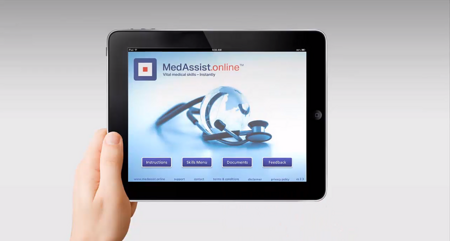“Doctor on board” via satellite communication with new Dutch app
The new Dutch application MedAssist Live allows doctors to offer medical assistance in even the most remote corners of the world via a satellite connection and two-way augmented reality. The NSO supported the technology development of the application, which is now ready for commercial use in the maritime industry and various other sectors.
A typical user case? Think of a worker on a container vessel that is sailing far out at sea, five days away from civilisation. The worker becomes seriously ill, but there is no physician on board. The captain can use the app on a smartphone or tablet to connect to a doctor on the mainland. Using a two-way satellite connection, they appear on the captain’s screen and can offer concrete guidelines on how to treat the sick worker. “We want everyone in the world to have access to the best possible medical care, even - or especially - when there is no physician or healthcare professional around,” says Walther Boon of MedAssist Online, the company behind the new application.

Source: MedAssist.online
Boon is a trained physician who used to work in the emergency room before becoming a medical adviser in the maritime sector. At first glance, the new application seems similar to a video conference with a general practitioner, which the current coronavirus pandemic has made more and more people familiar with. Still, the underlying technology is quite different: “First of all, we use augmented reality. This technology allows us to place a virtual representation of a physician “next to” a patient to provide aid. Furthermore, the patient is not located in a city or town where they can access a fast internet connection. Instead, they are in areas where only satellite communication is available. That actually posed the greatest challenge: how can you transmit a video feed back and forth via communication satellites, which only offer limited bandwidth?”
With help from the NSO and the ESA, MedAssist Online was able to develop a working prototype in just two years, which sufficiently compresses the connection data and compensates for the differences in upload and download speeds. The company has even come up with a solution for the sudden loss of satellite reception, which allows the system to automatically restore a secure connection without requiring the user to log in again.
“We have done everything we can to make the app as reliable and secure as possible while keeping the loss of image quality to an absolute minimum,” Boon says. “TNO and Thales are two of the parties that helped us develop the technology to get to this point. After that, we conducted extensive tests on board ships from Van Oord and Stena Line until we had a well-functioning prototype.”
That is precisely the aim of the NSO’s ARTES BASS programme: to further develop satellite communication technology in order to pave the way for new commercial applications. MedAssist Online is currently in talks with various parties, even outside the maritime industry. After all, this application is interesting to anyone who may need medical advice in a remote location.
More information about MedAssist Live
